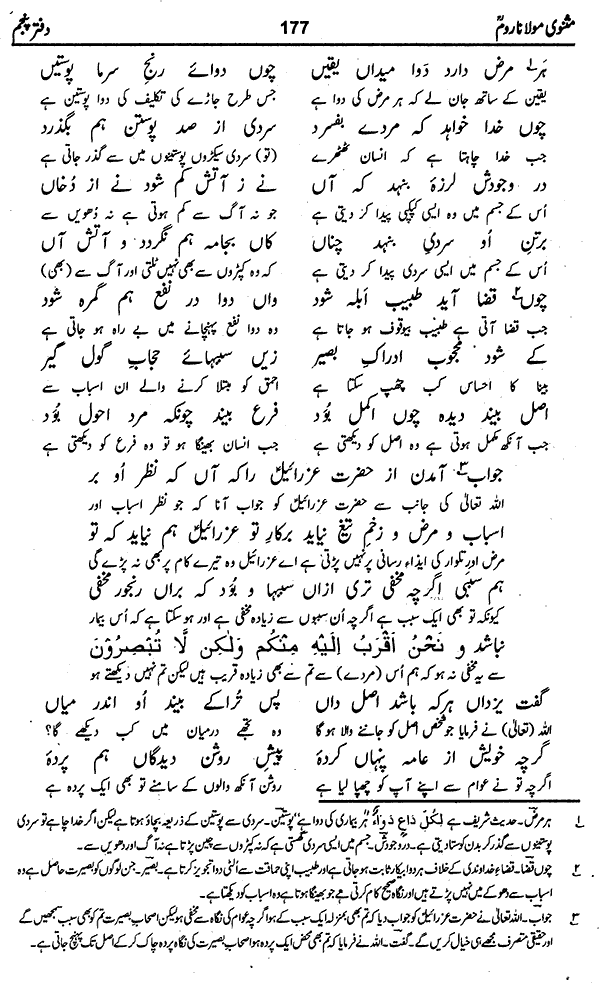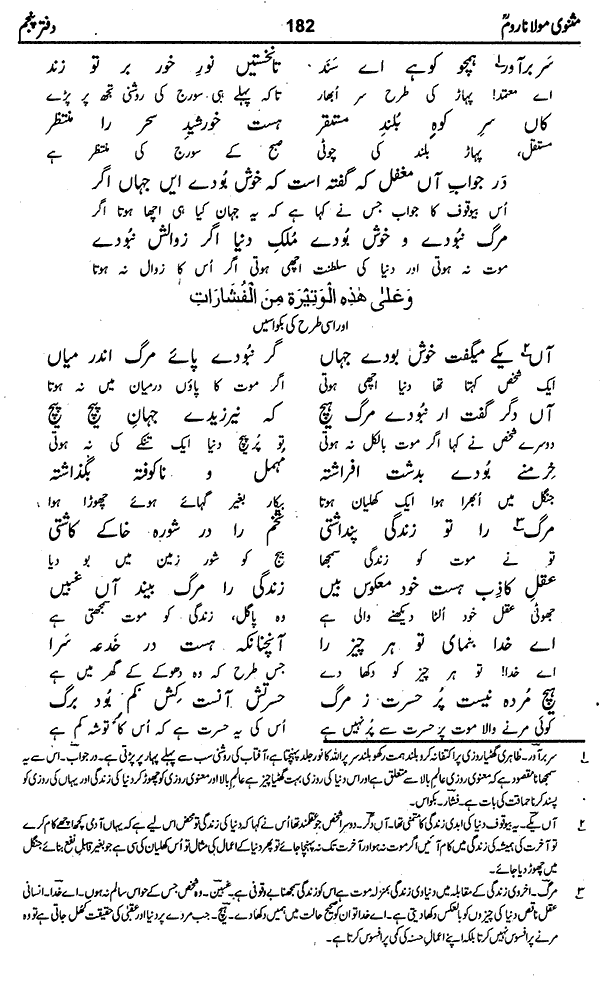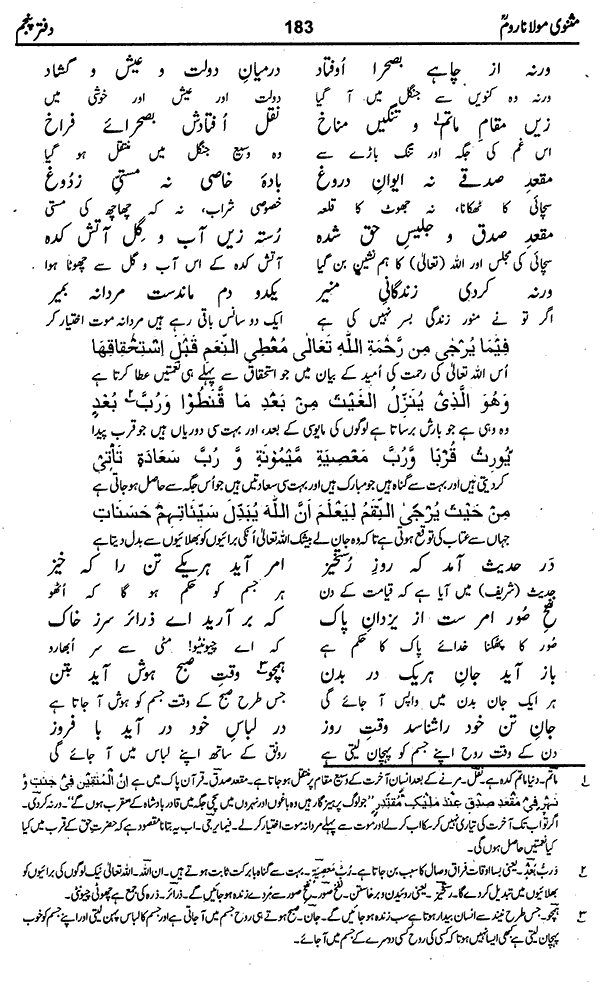The (Divine) answer,
(namely), “One who
does not regard
causes
and diseases and sword-wounds
will likewise pay no regard to your
action, O Azrael, for
you too art a (secondary) cause,
although you art more concealed than those (other) causes.” And maybe it (the real nature of Azrael) is not concealed from the sick (dying) man, for He (God) is nigher to him than ye are, but ye do not see.
Although you have concealed
yourself (Your real nature) from the vulgar, still to the clear-eyed (mystics) you art (no more than) a
veil (instrument).”
And (indeed) those to whom death is (sweet) as sugar—how should their sight be intoxicated
(dazzled)
with the fortunes (of this world)?
Bodily death is not bitter to them, since they go from a dungeon and prison into a garden.
They have been delivered from the world of torment: none weeps for the loss of (what amounts to) nothing, nothing.
(Will they say?) “Alas, he has broken this marble
stone, so that our
spirits and souls have
escaped from
confinement.
The beautiful marble and the noble stone of the prison-bastion were pleasing and agreeable (to us).
Why did he break them, so that the prisoners escaped? His hand must be broken (cut off) as a penalty for
this (crime).”
No prisoner will talk such nonsense except that one who is brought from prison to the gallows.
Like the prisoner in a dungeon who falls asleep at night and dreams of a rosegarden,
And says, “O God, do not bring me (back) to my body, (but let me alone) in order that I may walk as a prince
in
this garden.”
God says to him, “Your prayer is granted: go not back”—and God best knoweth the right course.
Paradise.
Does he feel any regret for (his former) wakefulness and for the body (which he has left) in chains at the
bottom of the dungeon?
(If) you art a true believer, come now, enter the ranks of battle, for a feast has been (prepared) for you in
Heaven.
In the hope of journeying upwards, (arise and) take your
stand before the mihráb, (to pray and weep) like a candle, O youth!
Let your tears fall
like rain, and burn (be ardent) in search (aspiration) all night long,
like the candle beheaded (by the flame).
Continually keep your hope (fixed) on Heaven, dancing (quivering) like the willow in desire for Heaven. Continually from Heaven (spiritual) water and fire will be
coming to you and increasing your provision.
If it (Your aspiration) bear
you thither, it
is no wonder: do not regard your weakness, regard
your search
(aspiration);
For this search is God's pledge (deposited) within you, because every seeker deserves something sought
(by him).
Though my body, like (other) bodies, is laid to rest, the Eight Paradises have
blossomed in my heart.”
When the spirit is lying at rest amidst roses and eglantines, what does it matter if the body is (buried) in that dung?
What should the spirit (thus) laid asleep know of the body, (or care) whether it (the body) is in a rose- garden or an ashpit?
If the spirit shall not live without this body, then for whom
shall Heaven be
the
palace (of everlasting abode)?
If your spirit shall not live without the body, for whom is the blessing (promised in the words) in Heaven is your provision?
Explaining the banefulness of the fat and sweet things of the World and how they hinder one from (receiving) the Food of God, as he (the Prophet) has said—“Hunger
is the Food of God with which He revives the bodies of the true (witnesses to Him),” i.e. in hunger the Food of God is (forthcoming); and
he has said, “I pass the night with my Lord and He gives me food and drink”;
and God has said, “being provided for, rejoicing.”
(If) you are delivered
from this provision of gross scraps, you will fall to (eating) dainty viands and noble
food.
(Even) if you are eating a hundred pounds' weight of His viands, you will depart pure and light as a peri;
(In the case of material
food) if you eat (too) little, you will remain hungry like the crow; and if you eat your fill, you will suffer from eructation.
If you eat (too) little, (the result will be) ill-temper and anaemia
and consumption; if you eat your fill, your body will incur (the penalty of) indigestion.
Through (partaking of) the Food of God and the easily digested (delicious) nutriment, ride like a ship on
such a (spiritual) ocean.
Be patient and persistent in fasting: (be) always expecting the Food of God;
The full-fed
man
does not wait expectantly for bread, (wondering) whether his allowance will come soon or late;
(But) the foodless man is always asking, “Where (is it)?” and expecting it hungrily and seeking and searching (for it).
Unless you are expectant, that bounty of manifold felicity
will not come to you.
(Practise) expectation, O father, expectation, like a (true) man, for the sake of the dishes from above.
When a magnanimous guest
will
not eat some
(inferior) food,
the host brings better food, Unless he be a poor host and a mean one. Do not think (so) ill of the generous Provider!
Lift up your head like a
mountain, O man of authority, in order that the first rays of the Sun may strike
upon you;
For the lofty firm-based mountain-peak is expecting the sun of dawn.
Reply to the simpleton
who has said that this world would be delightful if there were no death and that the possessions of
the
present life
would be
delightful if they
were not fleeting, and
(has uttered) other
absurdities in the same style.
The other said,
“If there were no death, the tangled world would not be worth a straw.
It would be (like) a stack heaped up in the field and neglected and left unthreshed.
You have supposed (what is really) death to be life: you have sown your seed in a barren soil.
The false (discursive)
reason, indeed, sees the reverse (of the truth): it sees life
as
death, O man of weak judgement.”
None that has died is filled with grief on account of death; his grief is caused by having too little provision
(for the life hereafter);
Otherwise (he would not grieve, for) he has come from a dungeon into the open country amidst fortune and pleasure and delight;
From this place of mourning and (this) narrow vale (of tribulation) he has been transported to the spacious
plain.
(’Tis) a seat of truth, not a
palace of falsehood; a choice wine, not an intoxication with buttermilk.
And if you have
not (yet) led the illuminative life, one or two moments (still) remain: die (to self) like a
man!







No comments:
Post a Comment